India's desire to upgrade its Air Force will take a step forward in the next couple of months when trials for 126 medium-range, multi-role combat aircraft begin.
The six companies in contention for the $10 billion deal are European Aeronautic Defence and Space Company (EADS), which has offered the Eurofighter Typhoon; American firms Lockheed Martin (F-16 Falcon/Block 52) and Boeing Integrated Defence System (F/A-18F Super Hornet); Russian Aircraft Corp's MiG-35; Swedish Saab's Gripen (JAS-39) and French major, Dassault's Rafale.
The evaluation trials would be conducted by various teams composed of test pilots, engineers and maintenance crew, which will be drawn primarily from the Aircraft Systems and Testing Establishment (ASTE).
State-owned Hindustan Aeronautics Ltd (HAL) would also be involved to look at issues concerning technology transfer and industrial partnership, besides the Centre for Military Airworthiness and Certification.
Let's take a look at what global giants are offering the Indian Air Force...
Dassault Rafale
Image: A Dassault Rafale fighter jet takes part in a flying display during the 48th Paris Air Show at the Le Bourget airport near ParisPhotographs: Pascal Rossignol/Reuters
Rafale features a delta wing with close-coupled canards. Its mission system has the potential to support all current and planned armaments.
Designed to replace 7 types of aircraft of the French Armed Forces, extremely powerful, highly agile and very discrete, the omnirole fighter flies the entire spectrum of modern air power missions from air-combat to anti-ship missions through air superiority, close air support, battlefield air interdiction, deterrence and reconnaissance.
Fitted with an awesome weapon load, which can be used simultaneously for air-combats and ground attacks during the same mission, integrating the largest and most modern sensors with the brand new technology of the multi-sensor data fusion, the Rafale Omnirole Fighter has a unique combined situational awareness and omnirole combat capability.
Its exceptional long range capabilities, thanks to its large fuel capacity and its stand-off missiles performances allow the Rafale to attack deep inside enemy territory and to guarantee air sovereignty to protect the country
Specifications:
- Span: 35.4 ft
- Wing area: 492 sq ft
- Length: 33.8 ft
- Height: 17,4 ft
- Load factors: +9g/-3.2g
- Max speed: M 1.8+/750 kts
- Approach speed: 120 knots
- Landing distance: 450 m (1,475 ft)
- Max climb rate: Over 1,000 ft/sec
- Operational ceiling: 55,000 ft
- Radius of action: More than 1,000 nautical miles
Saab Gripen
Image: A Saab Jas 39 Gripen fighter in action during the AirPower 09 airshow in Zeltweg in the Austrian province of StyriaPhotographs: Dominic Ebenbichler/Reuters
The Gripen is currently in service with Swedish, Czech Republic, Hungarian and South African Air Forces and has also been ordered by Thailand.
Gripen's design makes wide use of carbon-fiber composites and other new materials, advanced production technology, integrated computer systems, data fusion techniques and the latest aerodynamic concepts. The result is an aircraft with high levels of effectiveness in a wide range of roles, low acquisition costs, low support requirements and low operational and through-life costs.
According to Saab, Gripen is the first of the new generation, multi-role combat aircraft to enter service. Using the latest available technology it is capable of performing an extensive range of air-to-air and air-to-surface operational missions and employs the latest weapons.
The aircraft is cleared for the full spectrum of worldwide climatic conditions, it has the universal MIL-STD 1760 weapons interface, a secure and reliable communications fit for command and control and position reporting, a comprehensive navigation and IFF suite plus a fully functional air-to-air refueling capability using a retractable refueling probe.
Specifications:
- Length (excluding pitot tube): 14.1m (46ft 3in)
- Length (Two-Seat variant): 14.8m (48ft 5in)
- Wing span (including launchers): 8.4m (27ft 6in)
- Height overall: 4.5m (14ft 8in)
- Maximum take-off weight: 14 tons
- Maximum speed: M2.0 and supersonic at all altitudes
- Advanced cockpit layout with large color Multi-Function Displays (MFDs) and Hands-On-Throttle-And-Stick (HOTAS) controls
- Long range Ericsson PS-05/A multi-mode, pulse doppler radar.
EADS Eurofighter Typhoon
Image: An EADS Eurofighter Typhoon jet takes off in front of the Mount Pilatus at the Swiss Army Airbase in Emmen, central SwitzerlandPhotographs: Michael Buholzer/Reuters
Developed by Europe's leading aerospace companies, Eurofighter Typhoon is now the aircraft of choice for six Nations' Air Forces - Germany, Italy, Spain, United Kingdom, Austria and the Kingdom of Saudi Arabia. Aircraft production is ongoing, with 707 aircraft under contract to the six Nations.
Eurofighter Typhoon is a highly agile Air Superiority and Air-to-Surface, multi-role/swing-role weapon system, making it the one of the most capable front line fighter available.
According to the consortium website, the Typhoon offers maximum operational effectiveness and flexibility, high survivability, extensive technological growth potential, as well as high reliability and maintainability with low operating costs.
Specifications:
- Engines: Two Eurojet EJ200 turbofan engines, each delivering 60kN (13,490lb) in dry power and 90kN (20,250lb) with reheat
- Maximum speed: Mach 2.0
- Weapons: Internally-mounted 27mm Mauser cannon
- Total of 13 external stores stations: five (incl. one optional wet) under fuselage and four (incl. one optional wet) under each wing
- Four BVRAAM under fuselage in semi-conformal carriage configuration.
- Mix of Beyond Visual Range Air-to-Air missiles (BVRAAM) and Short-Range Air-to-Air Missiles (SRAAM) carried externally Full range of Air-to-Surface weaponry
Block II F/A-18E/F Super Hornet
Image: A Super Hornet carries out tests with ordnancePhotographs: Reuters/US Air Force Handout
According to Boeing, the Block II F/A-18E/F Super Hornet is the only 21st century, true multi-role aircraft that is available now and meets the tactical mission requirements of today's complex battle-space.
It can perform virtually every mission including air superiority, day/night strike with precision-guided weapons, fighter escort, close air support, suppression of enemy air defences, maritime strike, reconnaissance, forward air control and tanker missions.
Built by the industry team of Boeing, Northrop Grumman, GE Aircraft Engines, Raytheon and 1,900 other suppliers across the US, the Super Hornet provides the war-fighter with today's newest advances in multi-mission capability and growth for decades to come in missions, roles and technology, officials said.
With a total of 11 weapons stations, the Super Hornet provides war-fighters with extraordinary payload flexibility by carrying a mixed load of air-to-air and air-to-ground ordnance.
Two General Electric F414-GE-400 engines power the Super Hornet, producing a combined thrust of 44,000 pounds. The F414's light yet robust design yields a 9:1 thrust-to-weight ratio, one of the highest of any modern fighter engine, the officials said.
Specifications:
- Active electronically scanned array (AESA) radar
- Advanced targeting forward-looking infrared (ATFLIR) system
- Joint-helmet mounted cueing system (JHMCS)
- Multifunctional information distribution system (MIDS)
- Advanced aft crew station
- Fibre channel switch for increased data processing capability
- Fully integrated weapons systems and sensors for reduced crew workload and increased capability.
F-16IN Super Viper
Image: A graphical representation of the F-16INPhotographs: Lockheed Martin
Lockheed Martin claims that its F-16IN Super Viper shares a heritage with the world's only fifth generation fighters -- the F-35 Lightning II Joint Strike Fighter and the F-22 Raptor. Evolutionary integration of fifth generation technologies makes the F-16IN the most advanced fourth generation fighter in the world today, it adds.
Lockheed Martin claims that this ultimate fourth generation fighter is tailored exclusively to meet or exceed all of India's Medium Multi Role Combat Aircraft (MMRCA) requirements. Company executive Chuck Artymovich said that the proposed fighter planes would also be armed with infra-red search and track pods as well as, counter-electronic warfare pods.
With a robust upgrade capacity and the continuous insertion of technology, the F-16IN can be readily equipped with emerging capabilities throughout its lifecycle.
The low radar signature of the F-16IN reduces detection by enemy radars. Its single-engine design has smaller infrared and visual signature than twin-engine fighters. The internal electronic warfare and towed decoy systems, provided by Raytheon, avoid or defeat the most advanced threats. The F-16 is the fighter of choice for 24 nations with 52 follow-on buys, including successful international licensed manufacturing of 928 aircraft.
Specifications:
- Engine: One GE F110-132A, producing up to 32,000 lbs of thrust
- Max speed: Mach 2.0 (Fighting Falcon)
- Max takeoff weight: 48,000 lbs (Fighting Falcon)
- Radar: Northrop Grumman APG-80 AESA radar
Mikoyan MiG-35
Image: A MIG-35 fighter plane performs during the international air show near MoscowPhotographs: Sergei Karpukhin/Reuters
The Mikoyan MiG-35 is the production version of the latest MiG-29 and incorporates mature development of the MiG-29M/M2 and MiG-29K/KUB technology, such as glass cockpit and fly-by-wire technology. The IAF already operates 65 MiG-29s.
The fighter plane has the thrust vectoring of the MiG-29OVT as an additional option. Improved avionics and weapon systems, notably the new AESA radar and the uniquely designed optical locator system (OLS), make the aircraft less dependent on ground-controlled interception (GCI) systems and enables the MiG-35 to conduct independent multirole missions.
MiG-35 is the first Russian aircraft to be fitted with active electronically scanned array radar. The Zhuk-MA's antenna consists of 160 modules, each with four receive-and-transmit modules. It is believed to offer a 160km (85nm) air target detection radius and 300km for surface ships.
The MiG-35 is powered by two RD-33MKBs that can be fitted with KliVT swivel-nozzles and a thrust vectoring control (TVC) system. The MiG-35's combination of TVC and advanced missile-warning sensors gives it the edge during combat.
The aircraft's suite of guided weapons includes Kh-31A anti-ship missiles with active radar seekers, the Kh-31P anti-radar missiles, Kh-29TE missiles and KAB-500Kr TV-guided bombs. Added, when equipped with an external optical / laser targeting pod, the fighter can use the Kh-29L air-to-surface missiles and KAB-500L laser-guided bombs. These weapons will allow the aircraft to engage aerial and land targets
Specifications:
- Maximum speed: Mach 2.5 (2,400km/h, 1,491mph) at altitude
- Thrust / Weight: 1.14
- Length: 19m (62ft 4in)
- Wingspan: 15m (49ft 3in)
- Height: 6m (19ft 8in)
- Powerplant: 2 Klimov RD-33MK afterburning turbofans

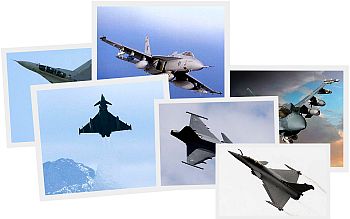


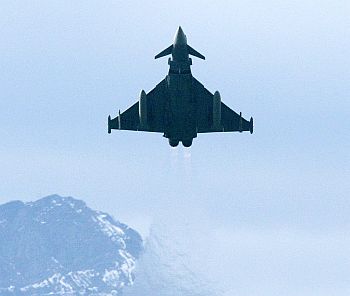
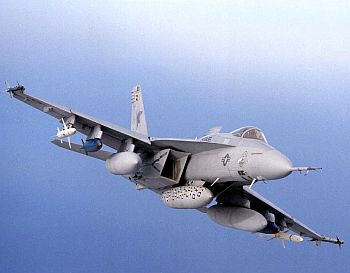
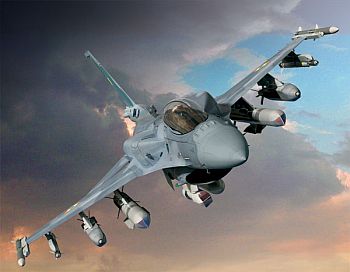
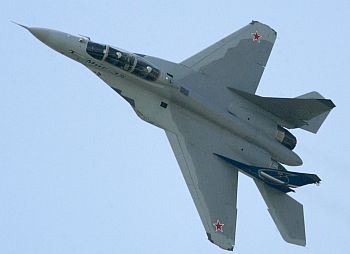
article